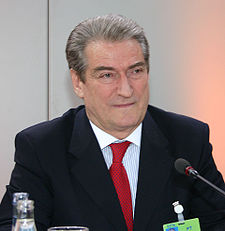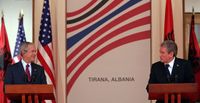Sali Berisha
| Sali Berisha | |
 |
|
|
Prime Minister of Albania
|
|
| Incumbent | |
| Assumed office 11 September 2005 |
|
| President | Alfred Moisiu Bamir Topi |
|---|---|
| Deputy | Ilir Rusmali Gazmend Oketa Genc Pollo Ilir Meta |
| Preceded by | Fatos Nano |
|
2nd President of Albania
|
|
| In office 9 April 1992 – 24 July 1997 |
|
| Prime Minister | Vilson Ahmeti Aleksander Meksi Bashkim Fino |
| Preceded by | Ramiz Alia |
| Succeeded by | Rexhep Meidani |
|
|
|
| Born | 15 October 1944 Viçidol, Tropojë, Albania |
| Political party | Democratic Party |
| Spouse(s) | Liri Berisha |
| Alma mater | University of Tirana |
| Profession | Cardiac surgeon |
| Religion | Islam[1] |
Sali Berisha (born October 15, 1944 in Tropojë) is an Albanian politician. Currently the Prime Minister of Albania. A cardiologist, and university professor he became formally active in politics in 1990 and later, in 1991 the leader of Democratic Party of Albania.
Contents |
Early life and career
Berisha was born in Viçidol, village near the border with Kosovo. He studied medicine at the University of Tirana, graduating in 1967. He specialized in cardiology and was subsequently appointed as an assistant professor of medicine at the same university and as staff cardiologist at the Tirana General Hospital. Proficient in English, French. During the 1970s, Berisha gained distinction as the leading researcher in the field of car-diology in Albania and became professor of cardiology at the University of Tirana. In 1978 he received a United Nations Educational Scientific and Cultural (UNESCO) fellowship for nine months of advanced study and training in Paris. Upon his return to Albania, Berisha conducted a research program on hemodynamics that attracted considerable attention among his colleagues in Europe. In 1986 he was elected member of the European Committee for Research on Medical Sciences where he worked for the elaboration of scientific researches strategies for “Health for all”.
He was a member of the Communist Party (Labour Party of Albania - PPSH) since 1969. In October 1989 interview with the Albanian Television service, Berisha urged the regime to initiate a broad program of liberalization but the taped interview was not allowed to be aired. In early 1990, Berisha urged the regime to expand the scope of reforms by including the establishment of a multiparty democratic political system and a market economy. By the beginning of 1991 Mr. Berisha had emerged as one of the most influential spokespersons for the reform movement in Albania.
In an interview for the Albanian Writers League newspaper published also in the international press, Berisha demanded that the remaining barriers to freedom of thought and expression be ended, that Albanians be granted the right to travel freely within the country and abroad, and that Albania abandon its isolationist foreign policy. At an August 1990 meeting of the nation’s intellectuals convened by President Ramiz Alia, Mr. Berisha urged the Albanian Party of Labor (APL) to abolish the third article of the communist constitution which sanctioned that the Party of Labor had the hegemony of the Power and to recognize Human Rights Charter, the drafting of a new democratic constitution, and remove all monuments of Stalin in the country.
In an article, published in the “Bashkimi” newspaper on September 17, 1990, Mr. Berisha condemned what he termed the “cosmetic reforms” of the Alia regime, which had only served to aggravate unrest within the nation. Without political pluralism, he argued, there could be not true democracy in Albania.
In December 1990, Berisha joined in the very first day, a series of students demonstrations that forced the government to approve the establishment of a multi-party system, Berisha emerged as the leader of Democratic Party (DP), the first and largest of the new opposition parties. He was formally elected DP chairman in February 1991 at the party’s first national congress. He has been elected member of Albania parliament in 1991, 1992, 1997, 2001 from the constituency of Kavajë.
President (1992-1997)
After the first free elections of Albania, Berisha was elected President of the Republic on April 9, 1992. Following his election as the second President of Republic of Albania, Mr. Sali Berisha and the democratic government were engaged into a profound course of political, economic, institutional, legislative and multifaceted reforms. Therefore, the complete privatization of land and residencies, as well as, of all small and medium state enterprises was accomplished over the period ’92-’96; the prices and the exchange rate were fully liberalized and, Albania changed from a country of a three figure inflation rate and economic growth regression of – 20% into a country with one figure inflation rate and with an average economic growth rate of 9% in ’92 and, in ’93 – ’96, 75% of GDP was generated from the private sector. Albania opened towards the West; it became a member of Council of Europe in 1995; it signed the Partnership for Peace Agreement in 1993 and it established a close cooperation with EU countries and USA. All laws of communist dictatorship were replaced with new laws of European standards and a series of institutions, which have not been in place before, like Constitutional Court and High Council of Justice were established.
Despite many reforms, the administration was marred by corruption and abuses and allowed the budding of Ponzi saving schemes. Progress was stalled in 1995 and it resulted in declining public confidence on government institutions. Berisha's loss of political support became clear in November 1994, when Berisha lost a constitutional referendum amidst fears the revisions he supported would have given him even more powers.
Berisha's Democratic Party won a general election in May 26, 1996, which was marred by accusations of intimidation, manipulation and violent squelching of a peaceful opposition protests discrediting them. The country plunged into a political crisis, as Democratic Party refused to annul the elections – they had won four-fifths of the seats in parliament – and the opposition Socialists abandoned the institutions.
The collapse of the Ponzi schemes towards the end of 1996, where it is alleged that Albanians invested $1 billion worth of life savings since 1994, recapped the crisis. The schemes failed, one by one, from December 1996, and demonstrators took to the streets to accuse the government of having stolen the money. Those demonstrations, were now taken over by the opposition. By March, military depots around the country were looted and for a time it looked like civil war would erupt between the government and rebels. Berisha refused opposition demands to step down and Multinational Forces of NATO were required to step in and take the situation under control. After their intervention in Albania, early elections were held in June 1997 and they led to the victory of a socialist-led coalition of parties. He resigned from the president's tenure one month after the loss of the elections of the DP and the victory of the left coalition. In July 1997, Berisha was replaced by the socialist Rexhep Meidani. Since then he has been the chairman of the DP, which became the biggest opposition party and eventually returned to power in 2005, which he has since then controlled with an iron hand, eliminating all the opponents and future competition.
Sali Berisha is an Honorary Member of The International Raoul Wallenberg Foundation.
Opposition (1997-2005) and Prime Minister (2005-2009)
Sali Berisha led the coalition of the center right wing parties in the general political elections held in 5 rounds in June-August 2001. Although OSCE/ODIHR International Election Observation Mission called these elections as manipulated ones, the coalition won 37% of the votes. He led continuous peaceful demonstrations demanding fresh elections. On the 3rd of July 2005 Sali Berisha was able to lead a coalition of five right center parties into the parliamentary elections, which eventually won a majority of 74 MP’s from a total of 140. He was appointed Prime Minister of Albania on the 8th of September 2005.
On June 10, 2007, Sali Berisha met with U.S. President George W. Bush in Tirana. Bush became the first U.S. president to visit Albania and repeated his staunch support for the independence of neighbouring Kosovo from Serbia: "At some point in time, sooner rather than later, you've got to say, Enough is enough. Kosovo is independent."[2]
On March 15, 2008, Berisha faced the toughest challenge of his government when an ammunition dump exploded in the village of Gërdec near Tirana, causing the deaths of 26 people and injuring over 100. Defense Minister Fatmir Mediu resigned, and the press reported many irregularities at the blast site, operated by an Albanian company that deactivated the country's aging ammunition and then sold it for scrap.
In June 2009, Berisha's Democrats declared a narrowly win parliamentary elections, only after joining forces with an opposite socialist party, the LSI, with which Berisha was obliged to share a great proportion of the government. But nevertheless, these elections have been declared as fraudulent by the opposition and are still disputable, since the Democratic Party of Berisha doesn't agree to recount the votes because the electoral court decided everything is in accordance with the law and only the constitutional court can decide either to recount the votes or no.The claimers that the elections were unfair do not possess any evidence to prove this and there is no case in the constitutional court about this matter.
Personal life
Sali Berisha is married to Liri Rama, a pediatrician, and the couple has two children, a daughter, Argita, and a son, Shkëlzen.
Foreign Languages Spoken
Berisha speaks some English, French, Italian and Russian [3].

Re-election in 2009
Albanian Prime Minister Sali Berisha's alliance won enough seats to form a government, though it fell one seat short of a majority during the elections of Jun 28th 2009. The election was seen as a critical test for Albania's aspiration of joining the European Union. It is the first time since the start of multi-party democracy in 1991 that a ruling party has been forced into a coalition through not winning enough seats on its own.[4]
See also
- History of Albania
- List of Presidents of Albania
References
- ↑ Nonneman, Niblock, Szajkowski, Gerd, Tim, Bogdan. Muslim communities in the new Europe. pp. 146.[1]
- ↑ "Bush Is Greeted Warmly in Albania". The New York Times. June 10, 2007. http://www.nytimes.com/2007/06/10/world/europe/10cnd-prexy.html?hp. Retrieved May 23, 2010.
- ↑ http://www.keshilliministrave.al/index.php?fq=brenda&r=&gj=gj1&kid=17
- ↑ "Albania PM re-election confirmed". BBC News. July 27, 2009. http://news.bbc.co.uk/2/hi/8171633.stm. Retrieved May 23, 2010.
External links
- Official website
- "Supplier Under Scrutiny on Arms for Afghans", New York Times article
- Sali Berisha news (in Albanian)
| Political offices | ||
|---|---|---|
| Preceded by Ramiz Alia |
President of Albania 1992–1997 |
Succeeded by Rexhep Meidani |
| Preceded by Fatos Nano |
Prime Minister of Albania 2005–present |
Incumbent |
|
|||||||||||||||||||||||||||||
|
||||||||||||||||||||||||||
|
||||||||||||||||||||||||||||||||